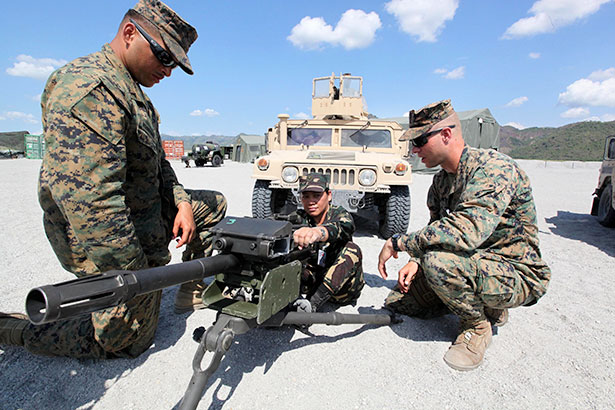
Under the Enhanced Defense Cooperation Agreement, United States troops will be deployed to Philippine bases on a rotational basis. STAR/Ernie Peñaredondo, file
The country should shift its focus to the modernization of its military instead of zooming into the Enhanced Defense Cooperation Agreement (EDCA) with the United States, analysts said.
Victor Andres Manhit and Angelica Mangahas of the ADR Institute noted that the Department of National Defense (DND) is the third-highest recipient of the funds from the 2016 national budget because of the Armed Forces of the Philippines (AFP) militarization program.
An estimated P175.2 billion was allotted to the DND for this year. It comes after the Department of Education with P435.9 billion and the Department of Public Works and Highways with P394.5 billion.
INFOGRAPHIC: 10 agencies with largest 2016 budget allocation
"No one can afford for these funds to be squandered, just as Filipinos cannot afford to miss out on opportunities for external assistance while the military gets its house in order," Manhit and Mangahas said in an article published by the Washington-based think tank Center for Strategic and International Studies.
The analysts recalled that the Philippines's key defense capabilities deteriorated when the country defunded the military program as a result of the 1997 Asian financial crisis. The AFP Modernization Act was signed in 1995 after the US withdrew its bases in the Philippines in 1992.
It was only due to the sea dispute against China when the government decided to invest in the Armed Forces once again.
"When the alarm bells rang in Manila over the standoff with China in Scarborough Shoal, both the executive and legislative branches of government got behind a renewed effort to invest in the Armed Forces even as diplomatic and legal processes were pursued by the Department of Foreign Affairs," Manhit and Mangahas said.
The EDCA would support the AFP modernization effort as its 10-year renewable period will coincide with the 13 years remaining in the modernizing law.
"The United States would shoulder the cost of upgrading AFP infrastructure for both countries’ use, boost disaster response readiness through pre-positioned supplies, and facilitate further training between military men on both sides," the analysts said.
Manhit and Mangahas, however, noted that the presence of American forces in the Philippines calls to mind the previous rape or murder cases and the outgrowth of the sex trade.
A stronger relationship with the two countries might also result in an undue influence of the US on Philippine foreign policy.
"Relatively strong Filipino negative sentiment over China’s behavior in the South China Sea in recent years may tip the balance in favor of EDCA at the moment, but the degree of domestic support at present may not be sustained under all other possible conditions," Manhit and Mangahas said.
The analysts suggested that the solutions to these concerns would be to raise expectations on the DND and the AFP and invest in capabilities that would have great returns to domestic security.
"With the Supreme Court’s decision, we should close the legal chapter in the book on EDCA and reorient our gaze to the AFP," the experts said.
On January 12, the Supreme Court ruled that the EDCA is constitutional and does not need Senate concurrence.
http://www.philstar.com/headlines/2016/02/05/1549990/analysts-philippines-should-focus-afp-modernization-not-edca

No comments:
Post a Comment
Note: Only a member of this blog may post a comment.